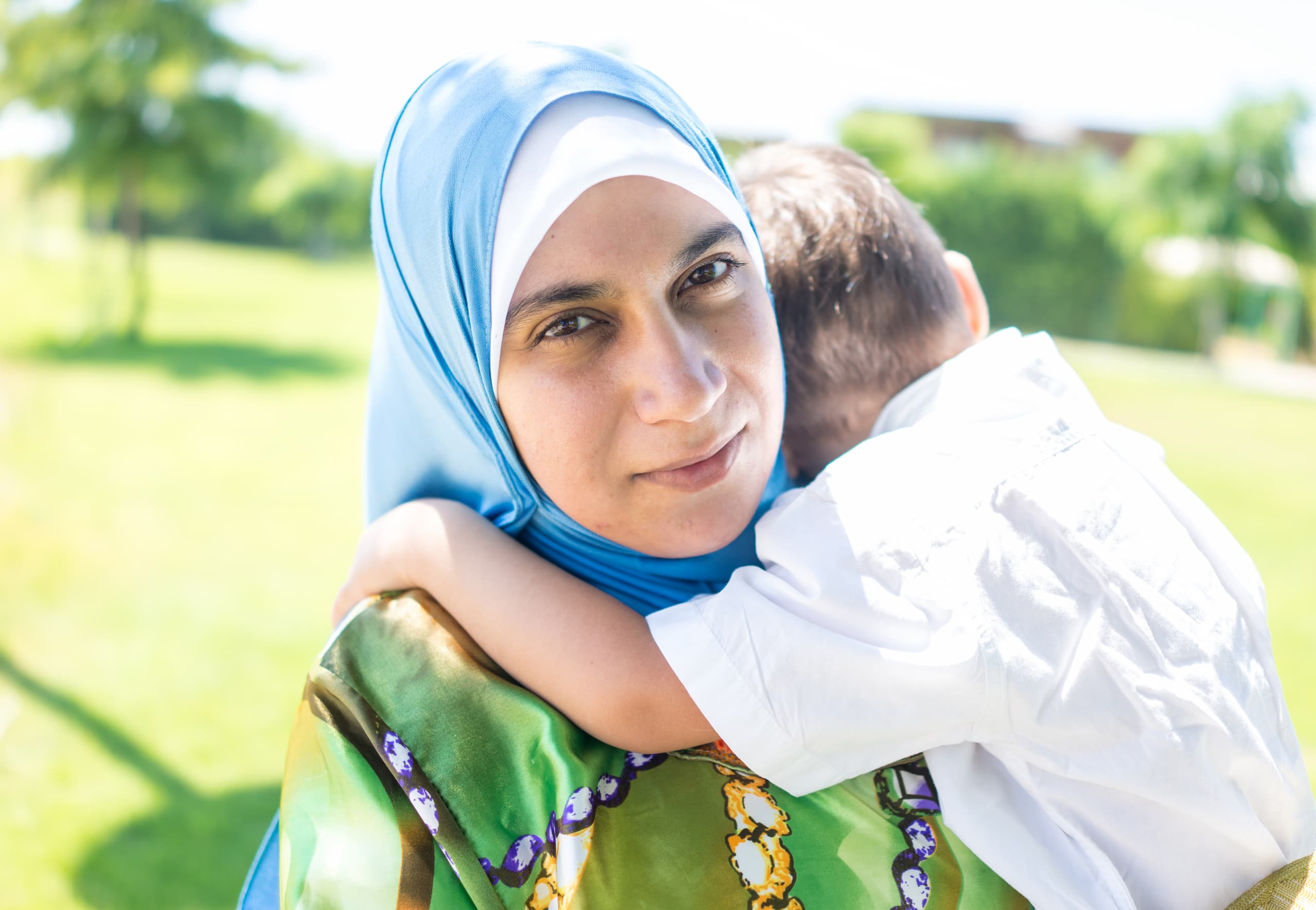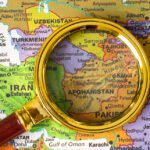Switchboard is committed to sharing stories of lived experiences with service providers across the U.S. Today, Switchboard is sharing the anonymous story of an Afghan American Social Worker who arrived in the United States as an Unaccompanied Refugee Minor.
Experiences in the U.S. Foster Care System
At the early age of 14, I was forced to be the primary caregiver to my then four-year-old brother in war-torn Afghanistan. Shortly after, my brother and I left behind our homeland and became refugees in Pakistan before making our way to the United States at the ages of 17 and seven. We arrived in the United States in 1996 as frightened minors without any support, unsure of what the future held for us. We did not know anyone and had no knowledge of the culture we were about to submerge ourselves into. As two minors with no legal guardians, we resettled as Unaccompanied Refugee Minors (URM), a program of the Office of Refugee Resettlement (ORR). This program provided us a foster home, a social worker, and various services to meet our basic needs. We were placed with an American foster family who only spoke English and had limited information about the beliefs, values, and culture that my brother and I came from. It became one of the hardest experiences I have had to endure.
I recall my foster mom would purchase prepackaged or canned foods for our family to eat. In Afghanistan, we prepared all our meals from scratch, so this was very unappealing and strange to me. I was determined to communicate independently with my foster mom regarding this concern. I took my Farsi/English dictionary and brought it to her while pointing to the word “grocery.” Thankfully, she understood and took me to the local grocery store. When I arrived, I was amazed to see that America had “real” food that was fresh. I was so happy to find familiar foods such as fresh vegetables, oil, rice, and halal meats. After this experience, my foster mom understood that my brother and I did not eat prepackaged meals or non-halal meat. She also learned that we were accustomed to cooking food from scratch.

Our foster mom was supportive of us, and I was gradually losing my role in my brother’s life as his “motherly figure.” I began to observe that my brother was receiving parental advice and influence from a non-Afghan parent. This concerned me, as he was adapting to American culture faster than I was comfortable with. I started to worry that Western culture was going to change us, and we would lose a sense of who we were and where we came from. Our foster family would take us to church every Sunday even though we are practicing Muslims. The worship service was in English, and my brother and I had no idea what it was all about. We had never been to nor seen a church before. I remember thinking to myself, “I am Muslim, and it is important that we attend Friday prayer and go to the Mosque.” Yet there we were, attending a service in a church and being exposed to a faith we did not practice. I felt lost and, more importantly, worried that my brother was going to lose his sense of self.
Years down the road, after gaining more direct access to organizations, programs, and systems, I learned that the URM program was doing their best in recruiting culturally appropriate foster parents. While recruitment of culturally matched foster parents continues, I have seen firsthand the improved efforts that ORR has put into training all foster parents on the cultural needs of Unaccompanied Refugee Minors using trauma-informed and culturally tailored services.
We had a social worker who regularly visited us and tried his best to help us adjust to our life in the foster home. Although he meant well, the language barrier made it challenging for us to explain how we felt or articulate the struggles we faced. I felt lost and unable to guide myself or my brother through this new world. These experiences drew me toward pursuing a career as a social worker myself. I wanted to help other people who experienced similar situations, and I knew my firsthand experiences as a refugee and caregiver would give me a deeper understanding of the struggles this population faces. The goal of studying to become a social worker fueled my determination and motivation to work harder to learn English and advance in my education.
Acculturation and Integration Experiences
When I started high school at the age of 17, my brother was a seven-year-old in elementary school. Oddly enough, I noticed that he was learning English quicker than me. This created a huge shift in my perception and my ability to be the “motherly figure” to him that I had always been. I became increasingly dependent on my brother to interpret and translate for me and even help me with my reading and writing. When I would use my Farsi/English dictionary, I would read the Farsi word but was not able to understand or read the English translation. Reading and writing in a different direction was also challenging. (In Afghanistan, we read and write from right to left.) In addition, the letters and alphabet were completely different.
After a year and a half of high school, I decided traditional high school classes were not an appropriate fit for me. I wanted to work and earn an income, which I could not achieve while going to school full time. School and education were always valuable to me, but at the time my primary focus was being able to take care of my younger brother. Luckily, I learned that I could take a combination of English Language Learner (ELL) classes, along with the college campus test, and subsequently enter college. I finished two years of community college and received an Associate of Art degree, and then I transferred to a four-year university to become a social worker. I eventually earned a Bachelor’s in social work with a minor in the Urdu Language. After a year, I applied to graduate school, earning my Master of Social Work one year later.

It took me time to understand that I had options in my educational journey. If I had support to understand the various paths from the beginning, it would have saved me a lot of time and anxiety.
At the age of 19, I wanted to move out of foster care with my brother, in part to live independently but mostly so I could re-ground my brother in our cultural foundations. However, our social worker did not want us to move away from our foster family. He explained that I would benefit from staying in foster care until I turned 21. I wanted to work toward independence, but at the same time I did not have a job. I decided to volunteer at a medical center, which continued to spark my motivation and determination to move out of my foster home.
Eventually I secured a job, which allowed me to move out of the foster home and get my own apartment. Unfortunately, I could not be a legal guardian to my younger brother because I was not 21 yet (a foster care requirement in the state that I lived in), so he remained in foster care. My heart was broken once again. I experienced a sense of loss and confusion that came along with this migratory life and transition. Getting my brother to live with me was my motivation to push myself to continue attending college classes full time and working full time. Between college and work, I would visit my brother at his foster home or his school, taking multiple buses to see him. He was living with a foster family that did not provide him with the cultural and religious support he needed. I would often prepare him Afghan meals so that he had a connection to family and familiarity through our food.
The loss of my ability to take care of my brother, in addition to the physical distance between us, made me lonely and depressed. Without him by my side, I felt like I was without any family. Not only did I feel helpless, but I felt unable to protect my brother from the many unknowns. To make matters worse, the language challenges caused me to miss a lot of buses when I attempted to visit him. I recall rainy and chilly days when I would be waiting at the bus stop and concentrating hard on the bus numbers approaching to ensure I would make the visit to see him.
One day, a woman came up to me at the bus stop and asked, “Do you want to come under my umbrella?” I responded, “No, thank you, I am fine.” She continued speaking to me, and I learned she worked at the same college I was attending. She shared her contact information and encouraged me to stay in touch with her. This connection became a huge lifeline, as she directed me to several resources at the college where I was able to receive help with my assignments. In addition, I was connected to a mentor at the college by the name of Marsha. I will never forget Marsha and all the support she gave me. She helped me for over a year and a half to receive my foster care license so that I could legally take care of my brother. Eventually, I became his foster mother.
I had started working in a retail store and earning money. I soon realized the responsibilities that come with having a job and being a caregiver. Navigating the adult working world with a young child was a daunting task, as America has many laws and regulations. I quickly had to learn how to work with this new system. I discovered that my brother needed to be in child care while I was working, which was a law in America. A friend taught me how to find child care and summer camps when he wasn’t in school. My goal was to be self-sufficient and support my brother without having to rely on government benefits.

When I reflect on the obstacles my brother and I faced, I feel a sense of accomplishment and pride that, through all the chaos and confusion, I worked full time and attended college full time, while also maintaining a high GPA. The challenging work and long hours paid off as I received one of the highest scholarships due to my GPA, and my university expenses for three years were covered. This was a great achievement, and I felt like the luckiest person in the world. I was slowly gaining independence and learning to adjust to life in the United States.
Considerations for Service Providers Supporting Refugees and Other Newcomers
Over the years, I would extend myself to help fellow newly arrived friends get connected to resources that helped me during my time of need. Presently, in my role as an experienced social worker advocating for refugee needs, I can provide my support and services to help others avoid the confusion and stress I experienced in my journey of integration. An effective service provider can only be helpful if they approach clients with a culturally informed lens. They need to understand the anxiety and concerns refugees and other newcomers face.
Many refugee parents have overcome hardships in their lives, and the stress of entering a new country poses additional hardship. It is vital for service providers to help them feel connected to their culture while also allowing them the ability to live within their new culture.
Here are some key ways to do this:
- Provide access to culturally appropriate food (as suggested by Switchboard’s Blog on Supporting Afghan Clients’ Food Needs during Ramadan)
- Connect newcomers to community and places of worship that are familiar and relevant to their practices
- Focus on the strengths, values, and resilience that refugees and other newcomers bring and have within them. It is important for service providers to build relationships with clients through active listening, using client-centered and strengths-based approaches. These approaches can foster a safe and confidential space where clients can feel comfortable opening up and sharing their needs, challenges, and successes.
- Help clients communicate effectively by providing interpreters whenever possible. If I had access to an interpreter during the time I was in foster care, I would have been able to communicate our needs effectively.
- Provide newcomers with educational opportunities, resources, job training, child care, access to medical care, and community support to help smooth the integration process
As an Afghan American social worker, I have been able to create a positive difference in my clients’ lives by supporting them in their resettlement experiences. I have become a well-respected mental health provider who strives to maintain a positive environment that reflects respect, dignity, and trust within the refugee community. I give credit to my own parents who taught me to forgive my transgressors and fight for what I believe in. They instilled in me a powerful desire to learn and to set goals I can achieve. Their lessons and my own firsthand experiences shaped me to become a social worker and to support and advocate for my clients to the best of my ability.









